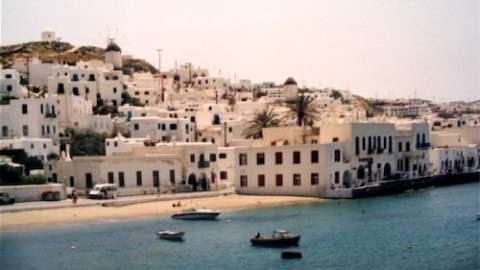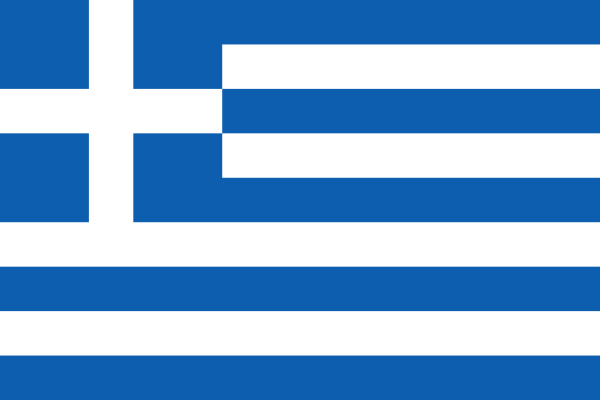With over 1,400 islands lying off its coast and scattered throughout the Aegean Sea, Greece is the most southeasterly extension of Europe. Regarded as the cradle of western civilization and is the birthplace of democracy, Western philosophy, the Olympic Games, western literature, political science, and drama.
Greece , historically also known as Hellas, is a country in southeastern Europe. It’s a geographically appealing place to visit, with a mountainous mainland of which Mount Olympus is the highest, once considered the throne of the Gods, is today extremely popular among hikers and climbers. Travellers are drawn by the island beaches and reliable sunny summer weather, its nightlife, historical sites and natural beauty.
The famous whitewashed homes and charming blue-domed churches only characterize a specific region of the country, the Cyclades Islands. Architecture varies greatly from one region to the next depending on the local history. The country is littered with many medieval churches and castles as classical ruins and temples.
Greece boasts a very long history, with the Greek language being present in the country for nearly 4000 years, the country’s first inhabitants are now referred to as the Pelasgians. The first advanced civilizations in Greece are known as the Cycladic in the Cyclades Islands, and the Minoan in Crete and Santorini. The Minoans had a written language which remains undecipherable to modern-day archaeologists.
Greece was the first area in Europe where advanced early civilizations emerged, the rise of city-states across the Greek peninsula and to the shores of the Black Sea, South Italy and Asia Minor, brought levels of prosperity that resulted in an unprecedented cultural boom, expressed in architecture, drama, science and philosophy, and nurtured in Athens under a democratic environment. Athens and Sparta led the way in repelling the Persian Empire in a series of battles, under the guidance of Alexander the Great from the northern Macedonian kingdom, conquered all of Greece, uniting and leading the Greek world to victory over the Persians, and proceeded eastward, creating an empire all the way to South Asia with the stated intent of spreading Greek Civilization. The empire broke up after Alexander’s death, and Greece was eventually annexed by the growing Roman Empire in 146 BC. Although weakened politically, Greek Civilization continued to flourish under Roman rule and heavily influenced Roman culture.
The mixture of Roman and Hellenic cultures took form in the establishment of the Byzantine Empire in 330 AD around Constantinople (now Istanbul). Byzantium remained a major cultural and military power for the next 1,123 years until the Fall of Constantinople to the Ottoman Turks in 1453. On the eve of the Ottoman conquest, much of the Greek intelligentsia migrated to Italy and other parts of Europe not under Ottoman rule, playing a significant role in the Renaissance through the transmission of ancient Greek works to Western Europe.
In the 18th century, both in Venetian/Genoese-occupied areas of Greece and from Greek communities abroad, led to an awakening among prominent Greeks and gave birth to the goal of an independent, unified, and sovereign Greek state. The Greek Revolution finally broke out on the 25th of March, 1821, and led to a long war against the Ottomans for independence. The Greek Revolution gained attention across Europe, with Russia, Britain, and France sending military aid to assist Greece.
After the Greek War of Independence, successfully waged against the Ottoman Empire from 1821 to 1829, the Greek state was finally recognized in 1830. The newly-independent Greek State was briefly a republic, before becoming a monarchy at the will of major European powers. As a result of the Balkan Wars, Greece increased the extent of its territory and population. In the aftermath of WWI, Greece fought against Turkish nationalists, a war which resulted in a massive population exchange from Turkey into Greek society. On 28 October 1940 Fascist Italy demanded the surrender of Greece, but the Greek dictator refused and Greece battled Italian forces into Albania. The country would eventually fall to German forces during the Battle of Greece, virtually the entire Jewish population was deported to Nazi extermination camps.
After liberation, Greece experienced a bitter civil war between communist and anticommunist forces for the next 30 years. King Constantine’s dismissal of George Papandreou’s centrist government in July 1965 prompted a prolonged period of political turbulence which culminated in a coup on 21 April 1967 by the United States-backed Regime of the Colonels, and a counter-coup established a dictator. On 20 July 1974, as Turkey invaded the island of Cyprus, the regime collapsed. Greek forces withdrew from the integrated military structure of NATO in protest at the Turkish occupation of northern Cyprus.
Democracy returned in 1974, and a national referendum abolished the monarchy, creating a parliamentary republic. Greece rejoined NATO in 1980 and the European Community in 1981, ushering in a period of remarkable and sustained economic growth. The country adopted the euro in 2001 and successfully hosted the 2004 Olympic Games in Athens.
Greek cuisine incorporates fresh ingredients into a variety of local dishes, the traditional Greek diet is very Mediterranean, espousing vegetables, herbs, and grains. Being a highly maritime nation, the Greeks incorporate plenty of seafood into their diet, by law, frozen seafood must be marked as such on the menu. The country is also a major producer and consumer of lamb; beef, pork, and chicken. Olive oil is a staple in Greek cooking, and lemon and tomatoes are common ingredients. Bread and wine are always served at the dinner table.
Traditional meals include Greek salad, a mix of tomatoes, cucumber, feta cheese and onion, all sliced, plus some olives, and occasionally green bell pepper or other vegetables, usually garnished with oregano, dressed only with olive oil. Moussaka, a rich oven-baked dish of eggplant, minced meat, tomato and white sauce. Saganaki, fried semi-hard cheese. Tzatziki for bread or to the top on souvlaki. For dessert, ask for baklava, tissue-thin layers of pastry with honey and chopped nuts. Another must-try is yoghurt with honey, genuine yoghurt in Greece has 10% of fat and is often thick but cooling.
Though it been more than a decade (1993) after my trip to Greece, reading the updated guide books and web sites that many of the islands have drastically changed, I’m proud to have been there when many of the towns and villages were escapes from the cities, rather than just landing on an island with a city on it, as seems the case today. Still, it is necessary for progress, but what was unspoiled islands in the Cyclades Aegean Sea is on a path of losing the charm I had experienced, with over development. Still, I remember well my days travelling from island to island and exploring new villages and towns at the entrance of each port, Greece by far is a great place for the intrepid traveller like me.

Athens
The capital and largest city, the birthplace of the modern world and the Olympic Games. Its a buzzing city with much to do, however the pollution sometimes overpowers its beauty, hence my escape to the Cyclades Islands.

Naxos
The largest island in the Cyclades island group in the Aegean, with several easily accessible ruins and has many beautiful beaches. Naxos marks the first place I went nude on a beach, after finding myself to be the only one to be wearing any gear I soon myself stripping it all off.

Mykonos
One of the top international tourist destinations, famous around the globe for its cosmopolitan character and its intense nightlife. It is also one of the most expensive places, due to the number of big spending gay tourists.

Santorini
Essentially what has been left from an enormous volcanic explosion which destroyed the settlements and led to the creation of the current geological calderas. Santorini still remains one of the top places on earth that I’ve visited, the sunsets are simply the best I’ve seen anywhere.

Paros
It lies to the west ofNaxos, with which it is separated by a channel about 8 km wide. Paros has a butterfly sanctuary, in which thousands fly and breed here, but it only happens once a year.

Antiparos
Just a ten minute boat trip from Paros, has delightful clothing optional beaches with powdery sand. The feature in the island of Antiparos is a stalactite cavern on the south coast. The grotto shows many examples of stalactite formations, the cavern walls are covered with graffiti, recording visitors during the 18th and 19th centuries.

Tinos
Famous amongst Greeks for the Panagia Evangelistria church, with its reputedly miraculous icon of Virgin Mary that it holds, a yearly pilgrimage that takes place where many pilgrims make their way the 800 metres from the ferry wharf to the church on their hands and knees as sign of devotion.
